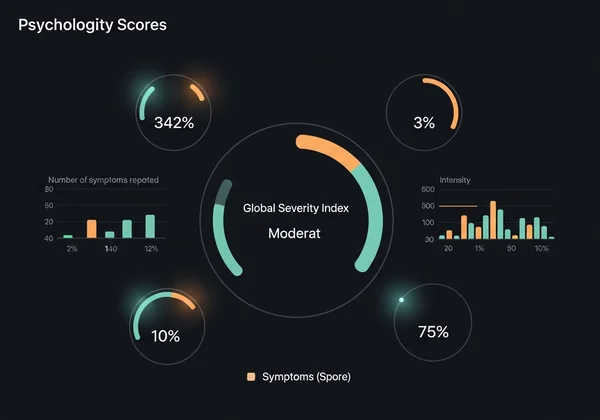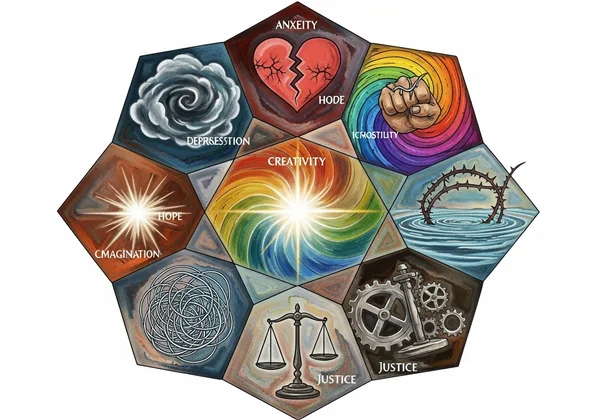SCL-90 Psychology Test Explained: Your Guide to 9 Symptom Dimensions
November 11, 2025 | By Marvin Martinez
Have you ever wished for a map to understand your inner world? The journey to self-awareness can feel complex, but powerful tools exist to light the way. The SCL-90 test is one such tool, a comprehensive psychological checklist designed to provide a clear snapshot of your emotional well-being. What is the SCL-90 Test and Why Does it Matter for You? For anyone seeking personal growth, this assessment offers valuable insights into the patterns of your thoughts, feelings, and behaviors.
With our free psychology test tools, our mission is to make that exploration easier. We provide a free, anonymous, and scientifically-grounded version of the SCL-90, enhanced with AI-powered analysis to give you a truly personalized report. This guide will walk you through everything the SCL-90 covers, helping you understand its structure and the meaning behind its nine core dimensions. Your journey to a richer life begins with understanding yourself, and you can start your journey today.

What Does the SCL-90 Measure? An Overview
Before we dive into the specific dimensions, let's understand the big picture. The Symptom Checklist-90 (SCL-90) is a well-respected psychological symptom checklist. Think of it as a detailed questionnaire that asks you to reflect on your experiences over the past seven days. It’s not about labeling or diagnosing; it’s about identifying areas of psychological distress that might be impacting your daily life. By seeing these patterns clearly, you gain the power to address them.
The test is designed to be a quick yet thorough inventory. Your responses provide a nuanced profile of your current emotional state, which is far more useful than a simple "I feel bad" or "I feel good." This profile helps pinpoint specific challenges, whether they relate to anxiety, mood, social interactions, or even physical symptoms tied to stress.
The Science Behind Your Self-Report Psychological Health Scale
One of the greatest strengths of the SCL-90 is its scientific foundation. This isn't a trendy online quiz; it's a self-report psychological health scale that has been used and refined by mental health professionals for decades. "Self-report" simply means you are the expert on your own experience. The test trusts your perception of your own feelings and behaviors, making it a deeply personal and empowering tool. Its reliability and validity have been established through extensive research, ensuring that the insights you receive are meaningful and based on established psychological principles. This scientific backing provides a trustworthy foundation for your self-exploration.
Understanding Global Severity & Other Key Indices
Beyond the nine specific dimensions, the SCL-90 calculates several overall scores, or indices, that give a bird's-eye view of your well-being. The most important of these is the Global Severity Index (GSI). The GSI is an excellent indicator of your overall psychological distress level. A higher GSI suggests a greater degree of emotional turmoil, while a lower score indicates a more stable state. Other indices help quantify the number and intensity of the symptoms you're experiencing. Together, these scores provide a comprehensive summary before you even look at the individual dimensions, helping you quickly grasp the main takeaways from your free assessment.

Decoding the SCL-90 Symptom Dimensions
The true richness of the SCL-90 lies in its nine distinct symptom dimensions. Each one acts like a different lens, focusing on a specific area of your psychological experience. Understanding them helps you see not just that you're feeling distressed, but how and where that distress is showing up. Let's break them down one by one.
Somatization: Understanding Bodily Distress & Aches
This dimension explores the connection between your mind and body. Somatization refers to physical symptoms that may be linked to emotional stress. This can include things like headaches, stomach issues, dizziness, or muscle soreness that don't have a clear medical cause. A higher score here might suggest that your body is carrying the weight of your stress, turning emotional pain into physical discomfort. Recognizing this is the first step toward finding relief.
Obsessive-Compulsive: Navigating Repetitive Thoughts & Behaviors
The Obsessive-Compulsive scale measures the presence of persistent, unwanted thoughts (obsessions) and the urge to perform repetitive actions (compulsions). These aren't just everyday habits; they are thoughts and behaviors that feel difficult to control and often cause significant distress. This could manifest as constantly re-checking things, intrusive mental images, or feeling a strong need for perfect order. Understanding this pattern can help you reclaim your focus and mental energy.
Interpersonal Sensitivity: Exploring Relationship Dynamics & Self-Consciousness
How you feel in social situations is the focus of this dimension. Interpersonal Sensitivity reflects feelings of inadequacy, self-consciousness, and discomfort during interactions with others. A high score may indicate that you worry a lot about what others think or tend to take criticism very personally. These feelings can make relationships challenging, but identifying them is key to building stronger, more confident connections. Are you ready to explore your profile?

Depression: Recognizing Mood Changes & Low Energy
This is one of the most well-known dimensions. The Depression scale assesses common symptoms like a persistent low mood, loss of interest in activities you once enjoyed, feelings of hopelessness, and a lack of energy. It also touches on feelings of worthlessness and thoughts about self-harm. A high score points to significant emotional pain and is a strong signal that it’s time to focus on self-care and potentially seek support.
Anxiety: Coping with Worry & Nervousness
While related to depression, Anxiety is distinct. This scale measures general signs of anxiety, such as feeling nervous, tense, or panicky. It also includes physical symptoms like a racing heart or trembling. It captures that constant sense of worry or dread that can be hard to shake. A high score suggests that feelings of fear and apprehension are playing a major role in your life. Our online psychology test can help you quantify these feelings.
Hostility: Addressing Irritability & Aggression
The Hostility dimension gauges feelings of anger, resentment, and irritability. It reflects a tendency to feel annoyed, get into arguments, or even have urges to act aggressively. Everyone feels angry sometimes, but a high score here suggests that these feelings are frequent and intense, potentially causing friction in your relationships and disrupting your peace of mind.
Phobic Anxiety: Confronting Specific Fears & Avoidance
Unlike the general worry measured by the Anxiety scale, Phobic Anxiety is about fear tied to specific things, places, or situations. This could be a fear of crowds, open spaces, or traveling alone. The defining feature is avoidance—going out of your way to steer clear of the thing that triggers your fear. Recognizing these specific fears is the first step toward confronting and overcoming them.
Paranoid Ideation: Discerning Distrust & Suspiciousness
This dimension measures feelings of distrust and suspicion toward others. It reflects a tendency to believe that others are trying to take advantage of you, talk about you behind your back, or are generally untrustworthy. These thoughts can lead to social isolation and make it difficult to form close, trusting bonds. Seeing this pattern can help you challenge these assumptions and open yourself up to more positive connections.
Psychoticism: Exploring Unconventional Perceptions & Experiences
The Psychoticism scale is often misunderstood. It’s not about being "crazy"; rather, it measures a range of unconventional experiences and thoughts, such as feeling isolated, believing others can read your mind, or having unusual perceptual experiences. This dimension captures a sense of alienation and a non-standard way of experiencing the world. Our AI-powered reports can help you understand your results from this and all other dimensions, providing clear, personalized insights.
Your Next Steps: From Understanding to Action
Learning about the nine dimensions of the SCL-90 is a fantastic step toward greater self-awareness. This knowledge empowers you to name your experiences and understand the complex interplay of your emotions. But true growth comes from applying this knowledge to your own life. The SCL-90 is not a final verdict on who you are; it's a dynamic map that shows you where you are right now.
Beyond the Results: Embrace Your Self-Discovery Journey
Your results are a starting point, not a destination. Use them as a guide to ask deeper questions. If you score high on Interpersonal Sensitivity, you might explore ways to build self-confidence. If Somatization is high, you could look into stress-management techniques like mindfulness or yoga. The goal is to use these insights to make small, positive changes that lead to a richer, more fulfilling life. The journey of self-discovery is ongoing, and every step counts.
Ready to Explore Your Own SCL-90 Profile? Take the Free Test Today!
Now that you understand the framework, are you curious to see what your own psychological profile looks like? You can gain valuable, personalized insights in just a few minutes. Take the free test on our homepage and unlock your AI-powered report.

FAQ Section
Is this online psychology test accurate for self-assessment?
Yes, the SCL-90 is a scientifically validated and reliable tool for self-assessment. While our online version provides a highly accurate snapshot of your current psychological state, it is important to remember that it is an informational tool, not a substitute for a professional clinical diagnosis from a doctor or therapist. It's best used as a starting point for self-reflection.
How to interpret SCL-90 results after taking the test?
Interpreting your results involves looking at both your overall scores (like the GSI) and your scores on each of the nine dimensions. A high score on a particular scale suggests you are experiencing significant distress in that area. Our platform simplifies this process by providing an instant summary and an optional AI-powered deep-dive report that explains what your scores mean in clear, personalized language.
What does a high score on a specific SCL-90 scale mean?
A high score on a scale like Depression or Anxiety indicates that you have endorsed many symptoms associated with that condition over the past week. It is a signpost, not a diagnosis. It highlights an area of your life that may need attention, compassion, and perhaps further exploration. It's a valuable piece of data to guide your personal growth, and using our online tool can help you see these patterns clearly.
How to know if I need a psychology test or professional help?
Taking a psychology test like the SCL-90 is a proactive step for anyone curious about their mental health or seeking self-improvement. If you've been feeling persistently overwhelmed, sad, or anxious, or if your emotions are interfering with your work, relationships, or daily life, a test can help clarify what's going on. If your results indicate significant distress, or if you are struggling deeply, we strongly encourage you to seek support from a qualified mental health professional.